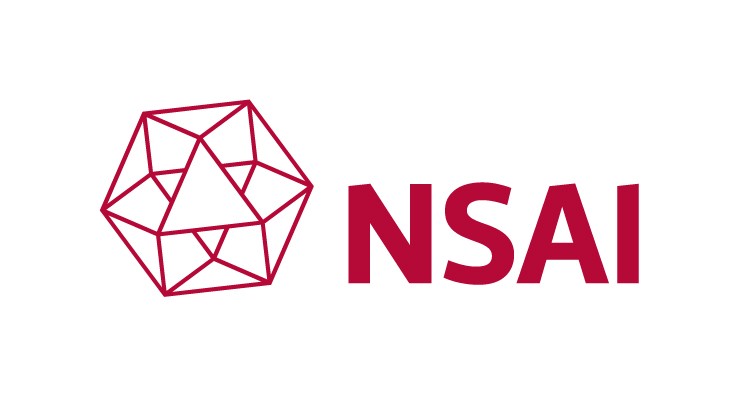NSAI Briefing Note on BIM (Building Information Modelling) Standards
How to drive consistency, efficiency and productivity in the Irish construction industry

The NSAI acknowledges the recent publication of the National BIM Council’s:
- Roadmap to Digital Transition for Ireland’s Construction Industry 2018-2021
- As well as the Irish Government’s Announcement to Increase use of Digital Technology in Key Public Works Projects.
The NSAI welcomes the recognition in these strategy documents, of the key role that “Standards” and “Certification” will play, to drive consistency, efficiency and productivity in the Irish construction industry. This has raised some enquiries about what standards are currently available for use, and what the NSAI are doing in relation to BIM. This information paper aims to provide some interim guidance on BIM standards for organisations, while the government strategy is implemented.
What is the NSAI position on BIM Standards Development?
In 2016, the NSAI established a national mirror committee for BIM, to monitor standards development work already being carried out by the European Standards Committee for Standardization (CEN) technical committee CEN/TC 442, as well as the International Organisation for Standardization (ISO) technical committee ISO/TC 59/SC13. Under EU regulations, once CEN begins working on EU standards, members states are precluded from developing or maintaining conflicting national standards, but can actively participate in, contribute to, or monitor, the work at CEN or ISO level. Since there are currently no national standards in this area, NSAI will not be developing any new national standards, but will continue to contribute to the work at CEN & ISO through the national mirror committee.
What do BIM standards cover?
In the broadest sense, the standards cover the production, management and exchange of architectural, engineering, construction and operational information, regarding the built environment. These standards deal specifically with the process for structuring electronic or digital building information, using Building Information Modelling (BIM). BIM refers to the use of a shared digital representation of a built object, to facilitate the construction and operation process, including buildings and infrastructure. BIM is relevant to planning, design, construction and operations of built assets, to form a more reliable basis for decision making and management.
Why are BIM Standards Important?
As the NBC’s “Roadmap to Digital Transition” correctly points out, “…a highly efficient digitised planning, design, construction and built asset or property real estate sector, will depend on highly standardized “machine readable” data. A common agreement (standard) between all of the various built environment stakeholders is required, on how to describe all elements of buildings or infrastructure, from the macro level, down to individual building products, in a common data language. This should be open, vendor-neutral, and in line with best-practice international and European standards, to allow Irish companies to work and compete at a global level”.
What standards are currently available to use?
The European Committee for Standardization (CEN) have already adopted three international standards (ISO) for building information, as listed below, which are now de facto Irish Standards, under EU regulation.
Read more about these standard here: BIM-Standars
- I.S. EN ISO 16739:2016 Industry Foundation Classes (IFC) for data sharing in the construction and facility management industries (ISO 16739:2013)
- I.S. EN ISO 12006-3:2016 Building construction - Organization of information about construction works - Part 3: Framework for object-oriented information (ISO 12006-3:2007)
- I.S. EN ISO 29481-2:2016 Building information models - Information delivery manual - Part 2: Interaction framework (ISO 29481-2:2012)
In the broader terms of managing built or property assets, it is suggested that ISO55000 “Asset Management” may be the most appropriate overriding standard. This has driven the development of standards in the United Kingdom over the past number of years, for managing the “information” about buildings, or built infrastructure, for both the capital delivery phase (design/construction), and the operations phase.
Some of these UK standards above have been made these freely available to industry through UK government sponsorship.
See here: BIM level 2
Why use UK standards in the interim period?
The development of further standards for BIM at ISO and CEN level, is currently in progress, and until these are officially adopted as European Standards, the UK standards above would be the most appropriate to use in Ireland in the interim period, because;- They are written in English,
- They are freely available,
- They are recognized by the professional industry groups in Ireland (see below), and
- They form the basis of current standards development (as noted below)
Technical committee ISO/TC 59/C 13 are currently in the process of developing ISO 19650 “Organization of information about construction works - Information management using building information modelling”, which is broadly based on BS 1192 and BS PAS 1192-2, but it is still in draft phase. This work is being done under the “Vienna Agreement” between ISO & CEN (i.e. CEN agree to contribute to the work of ISO, and not to duplicate the effort, or develop competing standards). Once ISO 19650 is agreed and accepted by CEN, it will become a European, and by extension, an Irish standard (as noted above, once CEN adopts a standard, the NSAI are precluded from developing or maintaining a competing national standard).
The development and adoption of ISO 19650 may take another 1-2 years. In the meantime, it is suggested that BS PAS 1192-2, and BS PAS 1192-3 would be the most appropriate standards to use and reference in Ireland. These were adopted by the RIAI (Royal Institute of Architects of Ireland) in 2013, and by the Construction Industry Council (CIC) of Ireland in 2015. The CIC represents the 6 main professional bodies in the Irish construction industry, including the Royal Institute of Architects of Ireland (RIAI), the Construction Industry Federation (CIF), Association of Consulting Engineers Ireland (ACEI), Engineers Ireland, Society of Chartered Surveyors of Ireland (SCSI), and Building Materials Federations (BMF), which forms part of the Irish Business and Employers Confederation (IBEC).
Using and adopting the UK standards in the interim period, will bring organisations much closer to the final outcome of ISO 19650, once that work is complete, and the transition to ISO 19650 will be easier, compared to disregarding the use of standards for the next 1-2 years.
BS PAS 1192-2 specification for information management for the capital delivery phase, would be the most appropriate standard to manage the planning, design, procurement and construction of built assets, and BS PAS 1192-3 specification for information management for the operations phase, would be the appropriate standard for the operations, property and facilities management of built assets. Both BS PAS 1192-2, and BS PAS 1192-3 refer to BS 1192 code of practice for the collaborative production and management of architectural, engineering and construction Information. The other UK standards listed above may also be relevant.
How does Brexit affect Ireland’s use of UK standards in the interim period?
The UK (through the British Standards Institute, or BSI) are actively involved in both ISO & CEN committees, and as noted above, there is an agreement between CEN & ISO not to duplicate effort or develop competing standards. Also, as noted above, the development of the ISO 19650 standard has been initially based on the UK standards.
The official statements from BSI regarding Brexit are to the effect that:
- They see UK interests being best served by BSI continuing as a full member of CEN and CENELEC into the future, and
- Should the outcome of the Brexit negotiations require CEN membership criteria need to be amended, to allow BSI to continue as a full member, BSI would be seeking support of members for such an amendment.
Nevertheless, should BSI be excluded from work at CEN in the future, they will continue their involvement with the International Organisation for Standardization (ISO), who are developing the ISO 19650 standard.
NSAI have requested, through the relevant Irish Government departments, that the UK produce a Brexit related position paper on standardization.
BIM Certification
NSAI intend to offer third party certification to ISO 19650 when it becomes available. Any work and organisation does in adhering to the existing PAS 1192-2 will not go unrecognised as much of PAS 1192-2 will be reflected in the new ISO 19650 when published by ISO.
Engage with the NSAI Technical Mirror Committee
If you, or your organisation have any particular queries in relation to BIM standards or certification, please feel free to address these to the contacts listed below. Equally, if your organisation wants representation on the National Mirror Committee, and have the technical expertise who would like to participate in, and contribute to the work of monitoring and evaluating the standards being developed in Europe or internationally, please let us know.












